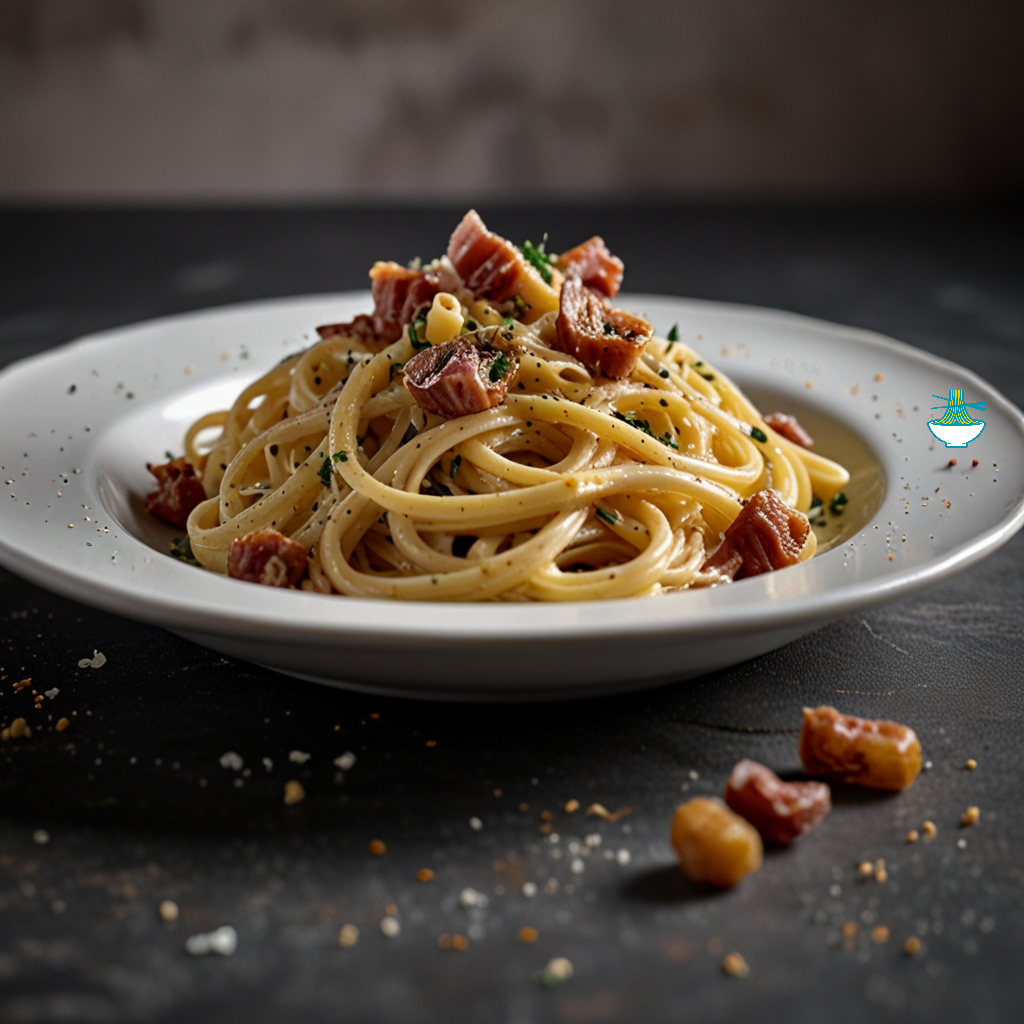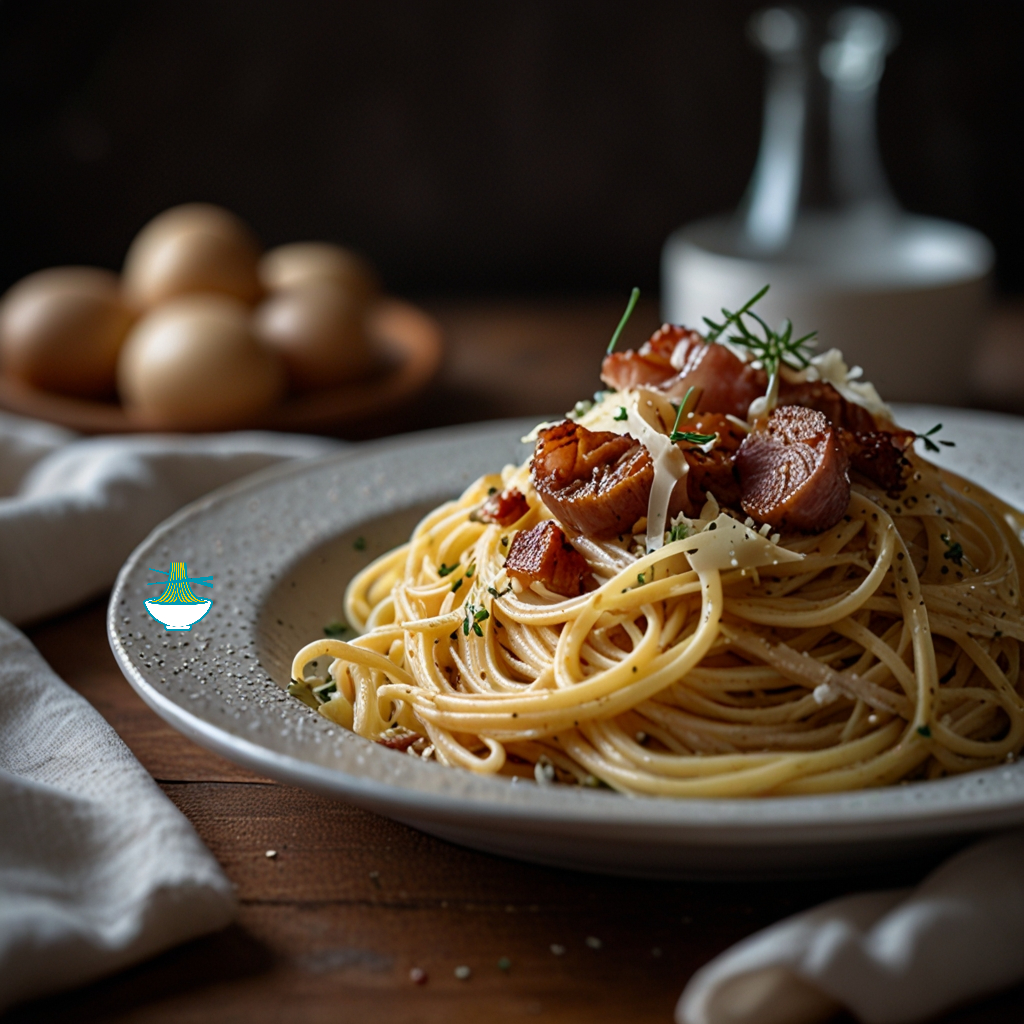Spaghetti Carbonara is a beloved Italian pasta dish that originated in Rome. Its origins are somewhat debated, with some theories suggesting it was created by coal miners (carbonai) who used easily accessible ingredients like eggs, cheese, and pork to make a hearty meal. 
The dish typically consists of cooked spaghetti tossed with a sauce made from eggs, grated Pecorino Romano cheese, crispy pancetta or guanciale (cured pork cheek), and black pepper. The heat from the pasta and pancetta cooks the eggs just enough to create a creamy sauce that coats the noodles, resulting in a rich and satisfying flavor.
Over the years, Spaghetti Carbonara has become a staple in Italian cuisine and gained popularity worldwide for its simplicity and delicious taste. It's often enjoyed as a comforting and indulgent meal, perfect for pasta lovers looking for a classic dish with a bit of history behind it.
Ingredients:
- 8 ounces (about 225 grams) spaghetti
- 2 large eggs
- 1/2 cup grated Pecorino Romano cheese
- 4 ounces (about 115 grams) pancetta or guanciale, diced
- Freshly ground black pepper
- Salt, for pasta water
Method of Preparation:
1. Bring a large pot of salted water to a boil. Cook the spaghetti according to package instructions until al dente. Reserve about 1/2 cup of pasta cooking water, then drain the spaghetti.
2. While the pasta is cooking, whisk together the eggs, grated cheese, and a generous amount of freshly ground black pepper in a bowl.
3. In a large skillet, cook the diced pancetta or guanciale over medium heat until crispy and golden brown. Remove from the heat.
4. Add the drained spaghetti to the skillet with the cooked pancetta or guanciale. Toss well to combine.
5. Quickly pour the egg and cheese mixture over the hot pasta, tossing continuously to coat the spaghetti evenly. The heat from the pasta will cook the eggs and create a creamy sauce. If needed, add some of the reserved pasta cooking water to thin out the sauce.
6. Serve the Spaghetti Carbonara immediately, garnished with extra grated cheese and black pepper.
Nutrition Value:
1. Spaghetti:
- Calories: Approximately 800 calories per 8 ounces (225 grams), depending on the brand and type of spaghetti.
- Carbohydrates: Around 160 grams, providing energy.
- Protein: Roughly 24 grams, contributing to muscle maintenance and repair.
- Fat: Minimal fat content in plain spaghetti.
- Sodium: Low sodium unless salted during cooking.
- Cholesterol: No cholesterol in plain spaghetti.
- Vitamins and Minerals: Contains small amounts of B vitamins and iron.
- Nutritional Benefit: Spaghetti is a good source of carbohydrates, which are essential for energy production and overall bodily function. It also provides some B vitamins and iron.
2. Eggs:
- Calories: About 140 calories per large egg.
- Carbohydrates: Very low, less than 1 gram per egg.
- Protein: Approximately 6 grams per egg, rich in essential amino acids.
- Fat: Around 10 grams, including healthy fats like omega-3 fatty acids.
- Sodium: Low sodium content.
- Cholesterol: High in cholesterol, about 186 milligrams per egg.
- Vitamins and Minerals: Rich in vitamin B12, vitamin D, and choline.
- Nutritional Benefit: Eggs are a complete protein source, providing essential amino acids. They also contain vitamins and minerals important for brain function, bone health, and metabolism.
3. Pecorino Romano Cheese:
- Calories: About 400 calories per 1/2 cup (50 grams).
- Carbohydrates: Minimal, less than 1 gram per serving.
- Protein: Approximately 30 grams per 1/2 cup.
- Fat: Around 32 grams, primarily saturated fat.
- Sodium: High sodium content, around 900 milligrams per 1/2 cup.
- Cholesterol: High cholesterol due to its dairy origin.
- Vitamins and Minerals: Rich in calcium and phosphorus.
- Nutritional Benefit: Pecorino Romano cheese provides protein, calcium for bone health, and phosphorus for energy metabolism.
4. Pancetta or Guanciale:
- Calories: About 400-450 calories per 4 ounces (115 grams), depending on the fat content.
- Carbohydrates: Negligible carbs, less than 1 gram.
- Protein: Roughly 15-20 grams.
- Fat: High fat content, primarily saturated fat.
- Sodium: Varies but can be high due to curing methods.
- Cholesterol: Contains cholesterol, especially in fatty cuts.
- Vitamins and Minerals: Provides some B vitamins and iron.
- Nutritional Benefit: Pancetta or guanciale adds flavor and texture, but it's high in saturated fat and sodium, so moderation is key.
5. Freshly Ground Black Pepper:
- Calories: Very low, negligible.
- Carbohydrates: Minimal.
- Protein: Negligible.
- Fat: Negligible.
- Sodium: Minimal, adds flavor without significant sodium content.
- Cholesterol: None.
- Vitamins and Minerals: Contains small amounts of manganese and vitamin K.
- Nutritional Benefit: Black pepper adds flavor and may have antioxidant properties due to its piperine content.
6. Salt (for Pasta Water):
- Calories: None.
- Carbohydrates: None.
- Protein: None.
- Fat: None.
- Sodium: Depends on the amount added.
- Cholesterol: None.
- Vitamins and Minerals: None.
- Nutritional Benefit: Salt is primarily used for seasoning and doesn't contribute significant nutrients.
Overall, this Spaghetti Carbonara dish provides a balance of carbohydrates, protein, and fats, along with essential vitamins and minerals. However, it's worth noting that ingredients like Pecorino Romano cheese and pancetta/guanciale are high in saturated fats and sodium, so consuming them in moderation is advisable for a balanced diet.


Comments